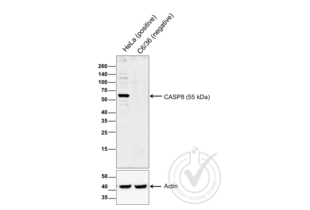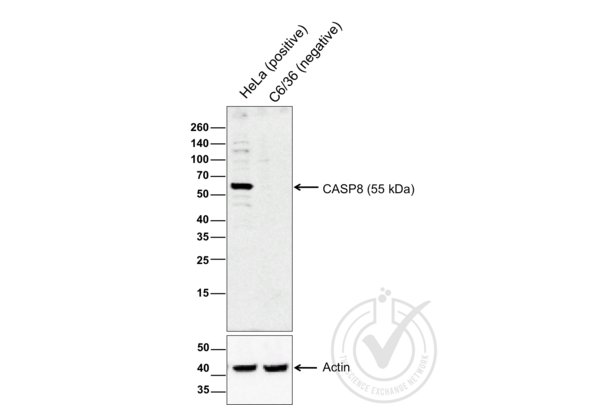Caspase 8 Antikörper

 Caspase 8 Antikörper (AA 411-482) (ABIN724205)
Caspase 8 Antikörper (AA 411-482) (ABIN724205)
CASP8 Reaktivität: Human, Maus, Ratte, Affe, Schwein, Schaf WB, ELISA, IHC (p), FACS, IF (cc), IF (p), IHC (fro) Wirt: Kaninchen Polyclonal unconjugated
CASP8 Reaktivität: Human WB, IHC, IF Wirt: Kaninchen Polyclonal unconjugated
CASP8 Reaktivität: Human WB, IHC, IP, ICC Wirt: Kaninchen Polyclonal unconjugated
Caspase 8 Antikörper nach Grade
Hier sind Caspase 8 Antikörper mit einem spezifischen Grade zu finden. Die hier aufgeführten Grade sind einige der verfügbaren. Ein Klick auf den entsprechenden Link führt zu den Produkten.
Caspase 8 Antikörper nach Reaktivität
Hier sind Caspase 8 Antikörper für eine Vielzahl von Species wie anti-Human Caspase 8, anti-Mouse Caspase 8, anti-Rat Caspase 8 zu finden. Die unten aufgeführten Species gehören zu den verfügbaren Arten. Klicken Sie auf einen Link, um zu den entsprechenden Produkten zu gelangen.
Caspase 8 Antikörper nach Wirt
Hier sind Caspase 8 Antikörper mit einem spezifischen Wirt zu finden. Die hier aufgeführten Wirt sind einige der verfügbaren. Ein Klick auf den entsprechenden Link führt zu den Produkten.
Caspase 8 Antikörper nach Klonalität
Finden Sie verfügbare monoklonale oder polyklonale Caspase 8 Antikörper. Klicken Sie auf einen Link, um zu den entsprechenden Produkten zu gelangen.
Häufig verwendete Caspase 8 Antikörper
- (15)
- (5)
- (1)
- (17)
- (12)
- (10)
- (9)
- (9)
- (4)
- (5)
- (2)
- (5)
- (9)
- (6)
- (4)
- (4)
- (4)
- (4)
- (3)
- (3)
- (1)
- (2)
Aktuelle Publikationen für unsere Caspase 8 Antikörper
: "NLRP12 collaborates with NLRP3 and NLRC4 to promote pyroptosis inducing ganglion cell death of acute glaucoma." in: Molecular neurodegeneration, Vol. 15, Issue 1, pp. 26, (2020) (PubMed).: "The protective role of the MKP-5-JNK/P38 pathway in glucolipotoxicity-induced islet β-cell dysfunction and apoptosis." in: Experimental cell research, Vol. 382, Issue 1, pp. 111467, (2020) (PubMed).
: "Downregulation of METTL14 increases apoptosis and autophagy induced by cisplatin in pancreatic cancer cells." in: The international journal of biochemistry & cell biology, Vol. 122, pp. 105731, (2020) (PubMed).
: "Triggering apoptosis by oroxylin A through caspase-8 activation and p62/SQSTM1 proteolysis." in: Redox biology, Vol. 29, pp. 101392, (2020) (PubMed).
: "Emodin induced necroptosis in the glioma cell line U251 via the TNF-α/RIP1/RIP3 pathway." in: Investigational new drugs, Vol. 38, Issue 1, pp. 50-59, (2020) (PubMed).
: "Microglia-derived TNF-α mediates endothelial necroptosis aggravating blood brain-barrier disruption after ischemic stroke." in: Cell death & disease, Vol. 10, Issue 7, pp. 487, (2020) (PubMed).
: "GL-V9 exerts anti-T cell malignancies effects via promoting lysosome-dependent AKT1 degradation and activating AKT1/FOXO3A/BIM axis." in: Free radical biology & medicine, Vol. 145, pp. 237-249, (2020) (PubMed).
: "Xanthones from the Bark of Garcinia xanthochymus and the Mechanism of Induced Apoptosis in Human Hepatocellular Carcinoma HepG2 Cells via the Mitochondrial Pathway." in: International journal of molecular sciences, Vol. 20, Issue 19, (2020) (PubMed).
: "Histone methyltransferase SETDB1 promotes colorectal cancer proliferation through the STAT1-CCND1/CDK6 axis." in: Carcinogenesis, Vol. 41, Issue 5, pp. 678-688, (2020) (PubMed).
: "Giardia duodenalis induces extrinsic pathway of apoptosis in intestinal epithelial cells through activation of TNFR1 and K63 de-ubiquitination of RIP1 in vitro." in: Microbial pathogenesis, Vol. 149, pp. 104315, (2020) (PubMed).
Aliase für Caspase 8 Antikörper
caspase 8 L homeolog (casp8.L) Antikörperdeath related ced-3/Nedd2-like protein (LOC661095) Antikörper
caspase 8 (CASP8) Antikörper
caspase-8 (LOC5563818) Antikörper
caspase-8 (casp8) Antikörper
caspase-8-like (LOC100222284) Antikörper
caspase 8 (Casp8) Antikörper
caspase 8, apoptosis-related cysteine peptidase (casp8) Antikörper
ALPS2B Antikörper
CAP4 Antikörper
CASP-8 Antikörper
Casp-8 Antikörper
casp8 Antikörper
CASP8 Antikörper
casp8-A Antikörper
caspase-8 Antikörper
FLICE Antikörper
MACH Antikörper
Mch5 Antikörper
MCH5 Antikörper
xCaspase-8 Antikörper
zgc:92075 Antikörper
Haben Sie etwas anderes gesucht?
- Caspase 7 Antikörper
- Caspase 6 Antikörper
- Caspase 4 Antikörper
- Caspase 3 Antikörper
- Caspase 2 Antikörper
- Caspase 12 (Gene/pseudogene) Antikörper
- Caspase 10 Antikörper
- Caspase 1 Antikörper
- CASP5 Antikörper
- CASP14 Antikörper
- CasLTR2 Antikörper
- CASKIN2 Antikörper
- CASK Antikörper
- Casein Kinase 1, delta Antikörper
- Casein Kinase 1 gamma 2 Antikörper
- Casein alpha-S2 Antikörper
- Casein alpha S1 Antikörper
- Casein Antikörper
- CASC5 Antikörper
- CASC4 Antikörper
- Caspase 9 Antikörper
- Caspase Activity and Apoptosis Inhibitor 1 Antikörper
- CASQ2 Antikörper
- CASR Antikörper
- CASS4 Antikörper
- CASZ1 Antikörper
- Catalase Antikörper
- Catechol-O-Methyltransferase Antikörper
- Cathelicidin Antikörper
- Cathepsin 7 Antikörper
- Cathepsin B Antikörper
- Cathepsin D Antikörper
- Cathepsin E Antikörper
- Cathepsin F Antikörper
- Cathepsin G Antikörper
- Cathepsin H Antikörper
- Cathepsin K Antikörper
- Cathepsin L1 Antikörper
- Cathepsin L2 Antikörper
- Cathepsin S Antikörper




